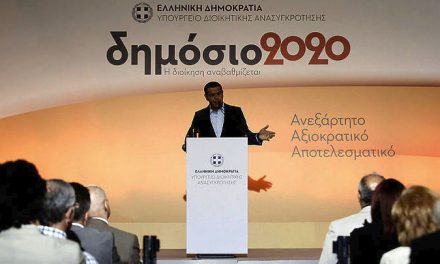University of Sussex Economics of Innovation Professor Marianna Mazzucato launched the Greek edition of her book “The Entrepreneurial State: Debunking Public vs. Private Sector Myths,” (published by Kritiki editions and edited by National Technical University of Athens Professor Yannis Caloghirou) at an event at the National Hellenic Research Foundation in Athens, on 19 May 2016.
Marianna Mazzucato’s book comprehensively debunks the myth of a lumbering, bureaucratic state versus a dynamic, innovative private sector. In a series of case studies – from IT, biotech, and nanotech to today’s emerging green tech – Professor Mazzucato shows that the opposite is true: the private sector only finds the courage to invest after an entrepreneurial state has made the high-risk investments. Professor Mazzucato has written extensively about the economic challenges in the Eurozone, arguing that the key problem in countries like Greece is not a liquidity crisis but a solvency crisis that can only be solved with a plan for investments that will enable long run growth.
The event, organized by the National Hellenic Research Foundation and Kritiki editions, began with a speech on the relevance of the book for Greece’s economy by the Greek Alternate Minister for Research & Innovation, Costas Fotakis. Professor Mazzucato gained the interest of over 250 attendants focusing on how interesting and dynamic synergies could be created between the State and the enterprises. The launch was followed by a workshop organised byMinister Costas Fotakisat the Ministry of Education, Research and Religious Affairs with directors from the Ministry of the Economy to discuss Mazzucato’s book and current work on mission oriented innovation policy.
Marianna Mazzucato also talked with Dimitra Mavridou (National Documentation Centre) about the Entrepreneurial State and its new role “from market fixing to market making”, facilitating innovation and cooperating cleverly with the private sector. In her interview Marianna Mazzucato makes interesting points about Greece and the EU: She posits that countries like Greece or Italy don’t have enough private investment, exactly because the state has not been fulfilling its proper role on making direct strategic mission-oriented public investments on fields like biotech, nanotechnology, the internet or green technology.”
As far as the EU is concerned, Mazzucato mentions that on one hand we have the Horizon 20/20 Programme with a budget of 80 billion for research and innovation; however member states are limited by the Maastricht criteria on how much money they can spend on science. Spain, for example, has cut its publicly funded research by 40% in order to stick to the Maastricht criteria. So, even when this budget is spread across Europe, if we don´t have the actual institutions that can spend that money in a strategic way and interact with each other in solidarity, this European money will not leverage much nationally. As Mazzucato points out, there is a lack of solidarity in the EU, because we don´t have yet a proper diagnosis on why there is such extreme difference in competiveness between the core and the periphery. As she puts it, “is it just that Greece has spent too much, has an inefficient public sector and rigidities in the labour market, or is it also because it actually hasn’t had the kind of public and private investments that Germany has had, it doesn’t have the same institutions, it doesn’t have an active strategic mission-oriented public Bank giving patient financing to the most innovative companies, it doesn’t have the Fraunhofer Instituteswhich create these very important linkages between science and industry? Also, Greece not only has a very low research and development spending but it also hasn´t been willing to think about the directionality of that spend, as Germany is today through the “Energiewende” policy.
Professor Mazzucato concludes that “we need a very different diagnosis of what is causing the skewed competiveness in Europe, and only once we get that, will the different pots of money that we have, whether is through the European Investment Bank, the Structural Funds, or Horizon 20/20, be able to interact with national policies that reflect these differences in competitiveness, and find a solution to actually become a serious innovation Union as opposed to a divided one.”
Watch a video recording of the book presentation on the National Hellenic Research Foundation site
Read Professor Mazzucato’s interview with “Capital”: Mariana Mazzucato: Greece shouldn΄t do what Germany says it does but what it actually does
Watch Professor Mazzucato speaking on Channel 4 news last year, about the Greek bailout: Greek bailout should be used to create infrastructure
Watch National Documentation Centre’s interview with Professor Mazzucato:














